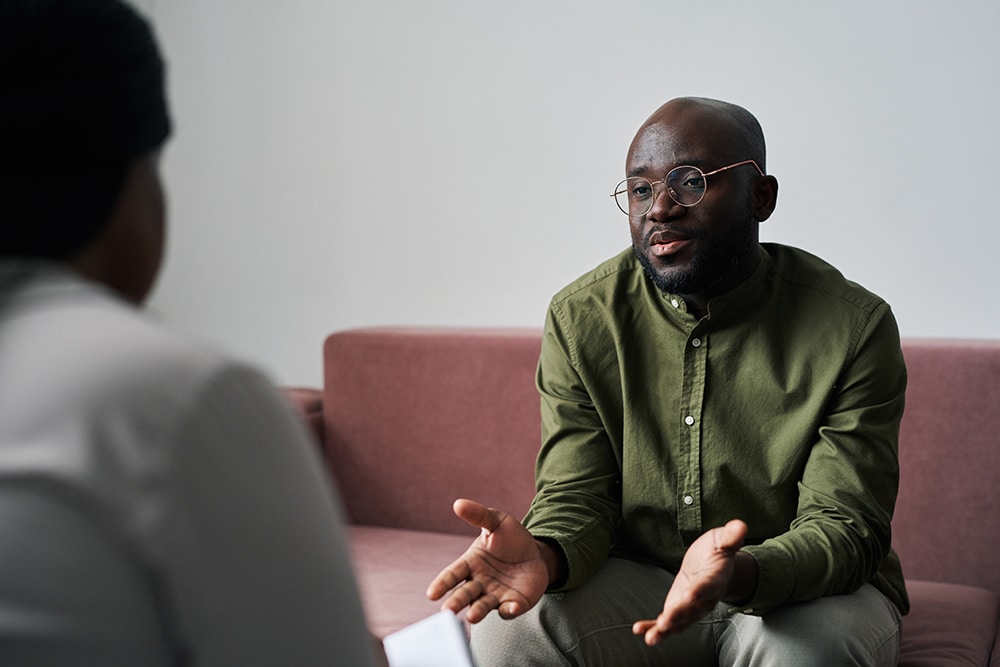How would your mental health be improved if, instead of going to a counselor, the counselor came to you?
That’s the motivation behind Counseling Services’ system of embedding counselors in places where students live, work and study—places they’re already comfortable in, that feel more like home, that don’t have the barriers sometimes associated with traditional offices. It’s an important step in ensuring that all NAU students, particularly those from vulnerable and marginalized populations, have access to mental health care.
“Ultimately, placing counselors across campus enhances accessibility to services, especially for certain individuals and communities who may not seek out mental health support through traditional means,” said Carl Dindo, director of Counseling Services. “There has been a growing emphasis on ‘meeting students where they are,’ particularly since 2020, so finding innovative and culturally responsive solutions to the mental health concerns of NAU students necessitated us looking beyond the traditional model of face-to-face counseling that has existed for a long time.”
Mental health care has always been tricky. Historically, it’s been stigmatized throughout society, and both research and anecdotal experience offer evidence that certain individuals and communities are even less likely to seek out mental health care for a host of reasons. Offering counselors in familiar spaces won’t remove all of those barriers—but it will remove a big one. And it’s not just the space; often, the counselors who serve students in these spaces may share a cultural background or identity with the students there.
Counselors are embedded in:
- IMQ
- Native American Cultural Center
- Gender Inclusive Housing
- Veterans Success Center in Franke
- Phoenix Bioscience Core (starting in the Fall 2023 semester)
Hear from a Native American counselor about her experiences offering counseling at NACC.
“What we have seen in terms of benefit extends beyond just increasing accessibility—we’ve seen students who have never sought out counseling support willing to do so because it’s in a different location,” Dindo said. “It also helps to have a counselor who ‘looks like them’ be the person responding to them in these spaces. Our embedded counselors offer a culturally responsive experience for students by modeling and normalizing the importance of prioritizing your mental health, and simultaneously increasing awareness and understanding about the ways that mental health intersects with other parts of their life and environment.”
Students also spoke to the benefit of having counselors in places in which the patients are comfortable. Two students who wished to remain anonymous shared their experiences seeking out embedded counselors in IMQ.
“I never thought that I would be someone to sought out therapy as a Latino with deeply rooted traumas. Additionally, the cost of therapy was something that made me shy away at first but because of the services at IMQ, I am able to come in for free and not have to worry about payments,” one student said. “You make sessions accessible, welcoming, and most of all safe. Therapy in the Office of Inclusion allows me to become more comfortable with my own emotions and expression as the space truly feels like a second home. Your existence on campus have saved so many lives, including my own.”
“Counseling can already be a bit nerve-wracking, especially if you have an identity that you feel might be misunderstood (queer, polyamorous, etc)—and clinical environments are notoriously slightly dehumanizing,” a second student said. “Being able to see my counselor at IMQ reduces some of that ambient anxiety and makes it easier for us to have an upbeat, productive session!”
This system also makes initial contacts, like asking questions and finding out what’s available, easier. For instance, Dindo said, many students never bother to ask for counseling support because they’ve heard there’s a long wait list. That’s no longer true, but the myth lives on. Being able to approach a counselor while studying at NACC or IMQ allows that myth to be debunked.
As always, Counseling Services offers in-person and telehealth mental health support in the form of individual and relationship counseling, support groups, outreach and consultation. Make an appointment with an embedded counselor or a counselor at Counseling Services by reaching out to campushealth@nau.edu or (928) 523-2261.
Interested in talking to a counselor or learning more about the mental health support NAU offers?
- Counseling Services is available 8 a.m. to 5 p.m. Monday through Friday, and offers same-day crisis/triage appointments every day. Students, or a staff member sitting with a student in need, may call (928) 523-2261 to schedule a same-day appointment. Case Management appointments are also available.
- Jacks Care 24/7 offers virtual mental health support and counseling to students, anytime and anywhere. Call (866) 656-9983 to speak to a counselor or download the Telus Health Student Support App for additional resources. Find it in the App Store or Google Play.
- Employee Assistance and Wellness offers support and services for NAU faculty and staff.
Heidi Toth | NAU Communications
(928) 523-8737 | heidi.toth@nau.edu




